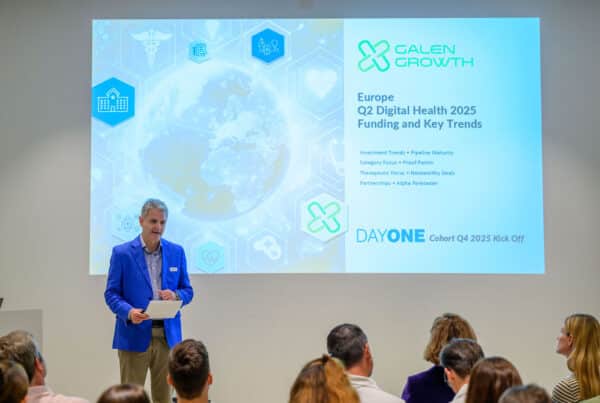Oncoustics is a medical device company, specialized in using artificial intelligence (AI) to analyse ultrasound data for diagnostics and treatment monitoring of diseases with high unmet clinical need.
Their technology focuses on low-cost, non-invasive surveillance, aiming to detect and monitor diseases like structural liver disease and other organ pathologies and cancers earlier and more accurately than traditional methods. By leveraging raw ultrasound signals and machine learning, Oncoustics enhances point-of-care diagnostics, making it faster and more accessible for clinicians. Their patented technology uncovers novel biomarkers, aligns with clinical standards, and is adaptable to any ultrasound-imaged anatomy, offering a scalable platform for early, rapid diagnostics that can reduce unnecessary biopsies and improve patient outcomes.
Oncoustics’ primary customers include hepatology and endocrinology clinics, with plans to expand into primary care. The company also partners with pharma companies to use acoustic biomarkers as endpoints in drug studies and to enhance patient enrolment in clinical trials.
Beth Rogozinski is the CEO of Oncoustics, bringing a strong background in deep tech and health tech. Based in Silicon Valley throughout her career, she has played key roles in several innovative companies. Notably, she was part of the founding team at Pear Therapeutics, whose product for treating substance use disorder (reSET), was the first software-only therapeutic approved by the U.S. FDA, marking a major milestone in healthcare and digital medicine.

DayOne spoke with Beth Rogozinski, CEO of Oncoustics and DayOne Accelerator Alumna 2024/25, about the role of AI in healthcare, the challenges of a startup and her advice for navigating these. This is what she shared.
Role of AI in healthcare
Healthcare remains the fifth least digitized industry globally and is in urgent need of transformation. AI is poised to play a major role in this shift. While AI has long been used in drug discovery, its expansion into direct clinical applications is inevitable. One of AI’s greatest strengths in healthcare is its ability to analyse complex data sets that are beyond human interpretation. Oncoustics is harnessing this potential by mining raw ultrasound sound data – a resource that’s typically discarded 90% of the time. Within this overlooked data lies valuable diagnostic and treatment-monitoring information that can significantly enhance patient care.
Right now, technology – especially AI and digitization – is a major focus in the industry. Beyond that, trends accelerated by COVID, like remote clinical trials and remote patient monitoring, are here to stay and will continue growing. These tech-enabled approaches are becoming standard in healthcare, and it shows how tailored technology can transform industries.
Advice for startups
Understanding the regulatory and security landscape is crucial. You also need to deeply understand the needs of your target customers – whether clinics or pharma companies. It all comes down to product-market fit: is there real demand for what you’re building, and how can you grow that demand? Ideally, you should have a clear grasp of your customer and their needs before writing a single line of code. Build for them, not just for the sake of building.
Two other key pieces of advice: fundraising is a challenging and demanding process – start early and focus on building strong relationships. And finally, remember that startups are a team sport. Network constantly. The more people you connect with, the greater your chances of success.
We’ve had a tough couple of years in health and health tech, especially since 2023. The biggest lesson has been the importance of resilience. You have to be able to weather the ups and downs and keep moving forward. We’re in the business of advancing healthcare innovation; we can’t afford to get discouraged – we have to keep pushing.
As mentioned, healthcare is the fifth least digital industry in the world, and it’s long overdue for transformation. The technology exists and the tools are available – it’s up to us to integrate them thoughtfully, keeping in mind regulatory and security requirements, and making sure they fit into real-world clinical workflows. There’s no need to fear AI – it’s just another tool and what matters is learning how to use it effectively.


